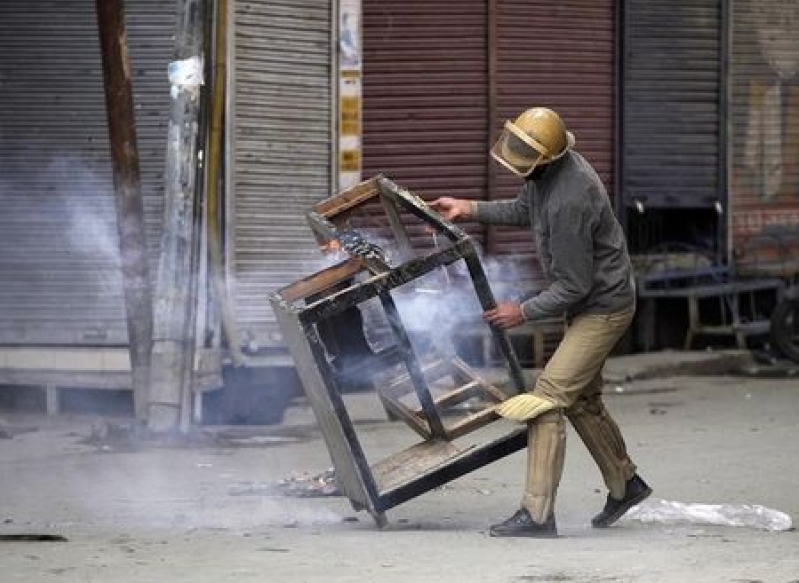
At least two dozen people have been injured in clashes with police after protests erupted in Indian Kashmir over the killing of a Muslim man by Hindus campaigning against eating beef.
The clashes in Kulgam and Anantnag districts broke out on Sunday after a trucker was attacked in the Hindu-dominated Jammu region of Kashmir by a crowd believing him to be involved in transporting cows, police said.
Protesters also pelted police with stones, police said, without specifying who had been injured since Monday.
Protesters have blocked the Srinagar-Jammu National Highway, the only road link to the Kashmir valley. Schools and offices remained shut in the valley following a strike called by separatist leaders and traders in protest at the murder.
"We imposed restrictions in Anantnag today as a precautionary measure after there were clashes soon after the death of truck conductor Zahid Ahmad," said SJM Gillani, head of the state police, said on Tuesday, referring to curbs on the movement of traffic and people.
Tempers had already been running high in Jammu and Kashmir, India's only Muslim majority state, after members of a little known Hindu group blackened the face of a state legislator with ink for throwing a party where he served beef.
Cows are considered holy by many, but not all, Hindus, who form a majority of India's 1.2 billion population. Beef is eaten by Muslims and Christians, as well as many lower-caste Hindus.
Prime Minister Narendra Modi's Bharatiya Janata Party (BJP) has long advocated a ban on killing of cows, but the constitution guarantees equal rights to minority Muslims and Christians, and Modi has called for religious harmony.
Nonetheless, the government is struggling to rein in hardline Hindu groups in parts of the country.
Hindu activists have stepped up their campaign in recent weeks on issues ranging from a ban on slaughtering cows to cricket matches with Pakistan, saying their rival neighbor must first stop Islamist groups operating from its soil.
Police in the southern city of Bengaluru ordered an inquiry after an Australian man complained in a Facebook post that he had been harassed by a mob and forced to write an apology by police for sporting a tattoo of a Hindu goddess on his leg.
Modi's critics say there is a climate of intolerance and that his party is pushing the agenda of the Hindu majority. President Pranab Mukherjee said tolerance was the essence of India's civilization.
"Humanism and pluralism should not be abandoned under any circumstance," he said in remarks widely interpreted as a signal to the Modi administration to crack down on fringe groups.
The latest trouble began when a Hindu mob lynched a Muslim man and beat up his son near the Indian capital, saying they had stored beef in their fridge.
(Reporting by Fayaz Bukhari in SRINAGAR, Derek Francis and Aby Jose Koilparambil in BENGALURU; Writing by Rajesh Kumar Singh; Editing by Sanjeev Miglani and Alison Williams)






